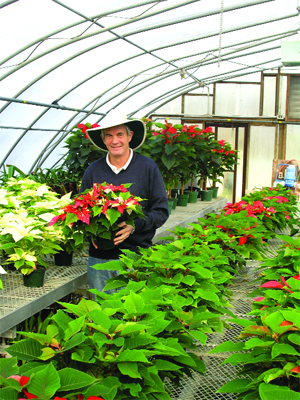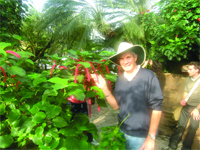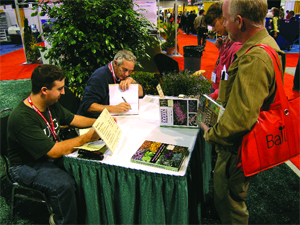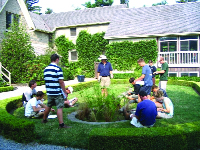
Features
Business
Trends
Talking about trends: Industry veteran says new plants may help counter slimmer margins
March 14, 2008 By Dave Harrison
If you’re looking for something new to wow consumers or tap new markets, how about shrubs?
Dr. Allan Armitage has been studying the utilization of woody shrubs by greenhouse growers and retailers. And his work to date suggests some market potential for them.
The renowned University of Georgia professor, researcher, breeder, author and lecturer spent much of last year on sabbatical at the Niagara Parks Commission School of Horticulture. I had a chance to chat with him in the school’s library just prior to his return south, with much of the discussion centring around industry trends.
“Shrubs are just emerging now,” he explained. “The greenhouse industry should get more involved with them.”
Consumers will appreciate their low-maintenance requirements. “You don’t have to spend a lot of time with shrubs,” noted Dr. Armitage. “While we enjoy being surrounded by pretty plants, we don’t want to be out there weeding every day.”
Breeders have done their part with some impressive work on compactness and foliage colours. Hydrangeas are a prime example. “There are a zillion hydrangeas out there today because they’re the ‘in’ plant,” he said. “Put them in gallon containers and get them out there.”
 |
| Dr. Allan Armitage chose the NPC School of Horticulture for his recent sabbatical. |
And while you’re clearing space for a new shrub line, save room for native plants. “There’s all sorts of great breeding being done, and it’s not just because they’re native plants, it’s because they obviously perform so well.”
Heuchera, gaura, coreopsis and phlox are already strong market performers. Each have become mainstream favourites.
Grasses deserve more attention. “There’s a lot of interest in them already, and the reason for that is because they’re so low maintenance.” And if it’s a native variety, “it’s an even lower, low-maintenance plant.”
Containers and planters continue to enjoy strong sales. Gardeners don’t want to spend the same amount of time in their yards as they used to. That’s why the instant gardens provided by containers have become so popular.
“They’ve allowed more of us to become gardeners, especially those not interested in digging in the soil.” That’s especially true with young consumers. “Containers help ensure they’ll have greater gardening success.”
Even baby boomers are joining the bandwagon. “We’re getting older and a little tired,” he quipped. “It’s an easier way to garden.”
Some plants look much better in containers than in garden beds, he noted, including some bacopa and diascia varieties.
Fear of failure discourages many would-be green thumbs. Sometimes the problems are beyond their control. Drought conditions plagued a few markets last year, in particular the southeastern U.S. “People won’t buy plants if they know they won’t be able to water them.”
The problem is that the memories of droughts or a late freeze will linger. “People won’t buy plants the next year, or they won’t buy as many.”
The plant industry is in fairly good shape, “though the margins are getting thinner.” And it’s because of those thinner margins that growers have to look at new products and niche opportunities.
When it comes to marketing, independents have the edge over box stores, but the gap is narrowing.
 |
| Dr. Allan Armitage, taking a break touring the Niagara Butterfly Conservatory. |
“The best garden centres offer consumers a positive plant experience and you want to go back there,” said Dr. Armitage. “They have staff that can answer your questions. The displays are set up so you can easily find what you need.”
Box stores are keeping up the pressure. “They are run by very bright people who know how to make a profit. They can see what’s possible in the plant game.” Many of them don’t give their plants enough attention, though there are a growing number now putting in the effort. Lowe’s is a good example of this trend towards better plant care. They’ve got the industry’s attention, “because they can sell a lot of products.”
Pay-by-scan growers he’s talked to are generally positive about the system. “It’s got them thinking a little more about what to grow and how to merchandise it,” he said. However, the downside has been that they’ve become more conservative and are less willing to take chances with new material.
Summing up his sabbatical, Dr. Armitage offered high praise for the NPC School of Horticulture. “It’s a very intense program,” he noted, “with considerable hands-on experience in addition to the classroom work. And the staff is exceptional.”
The sabbatical included a combination of writing, teaching and mentoring, and he also took time to host some garden tours. He taught a course in greenhouse crop production, including potted mums “from start to finish,” and seed geraniums.
“I had great fun,” he said. “It wasn’t long enough, but it was a great experience.”
| Renowned teacher, Researcher, author and lecturer
Dr. Allan Armitage was born in Montreal and In addition to his teaching responsibilities at the University of He also promotes Athens Select varieties, plants noted for superior His research has included work on commercial cut flower production, He is also on Smart Gardening TV, a show available in most major U.S. markets, and has been a guest correspondent for the popular Victory Garden television series. And when he’s not talking about plants, he’s writing about them, the result being some 350 articles and 11 books. |
 |
| A speaker at last fall’s Canadian Greenhouse Conference, Dr. Armitage also took time to autograph some of his books. |
 |
 |
| Dr. Armitage leads a plant identification discussion with first year NPC School of Horticulture students. Photo courtesy NPC School of Horticulture |
Print this page